Primary Care Nursing: Person-Centered Diabetes Care in Community
VerifiedAdded on 2023/06/03
|18
|5339
|262
Essay
AI Summary
This essay examines the crucial role of primary care nurses in delivering person-centered care to individuals with diabetes within community settings. It emphasizes the rising prevalence of diabetes and its associated healthcare costs, highlighting the need for preventative strategies and effective patient management. The essay explores the duties and responsibilities of nurses, including illness prevention, health promotion programs, and patient education. It also addresses the importance of the bio-psycho-social model, principles for caring for chronic ailments, and the nurse's role in bridging community services with acute sectors. The essay underscores the significance of equity, access, evidence-based practices, and sustainability in providing comprehensive care. By focusing on patient self-management, interprofessional collaboration, and responsiveness to changing patient needs, the essay provides a detailed overview of how nurses can improve outcomes for diabetes patients and control healthcare costs.
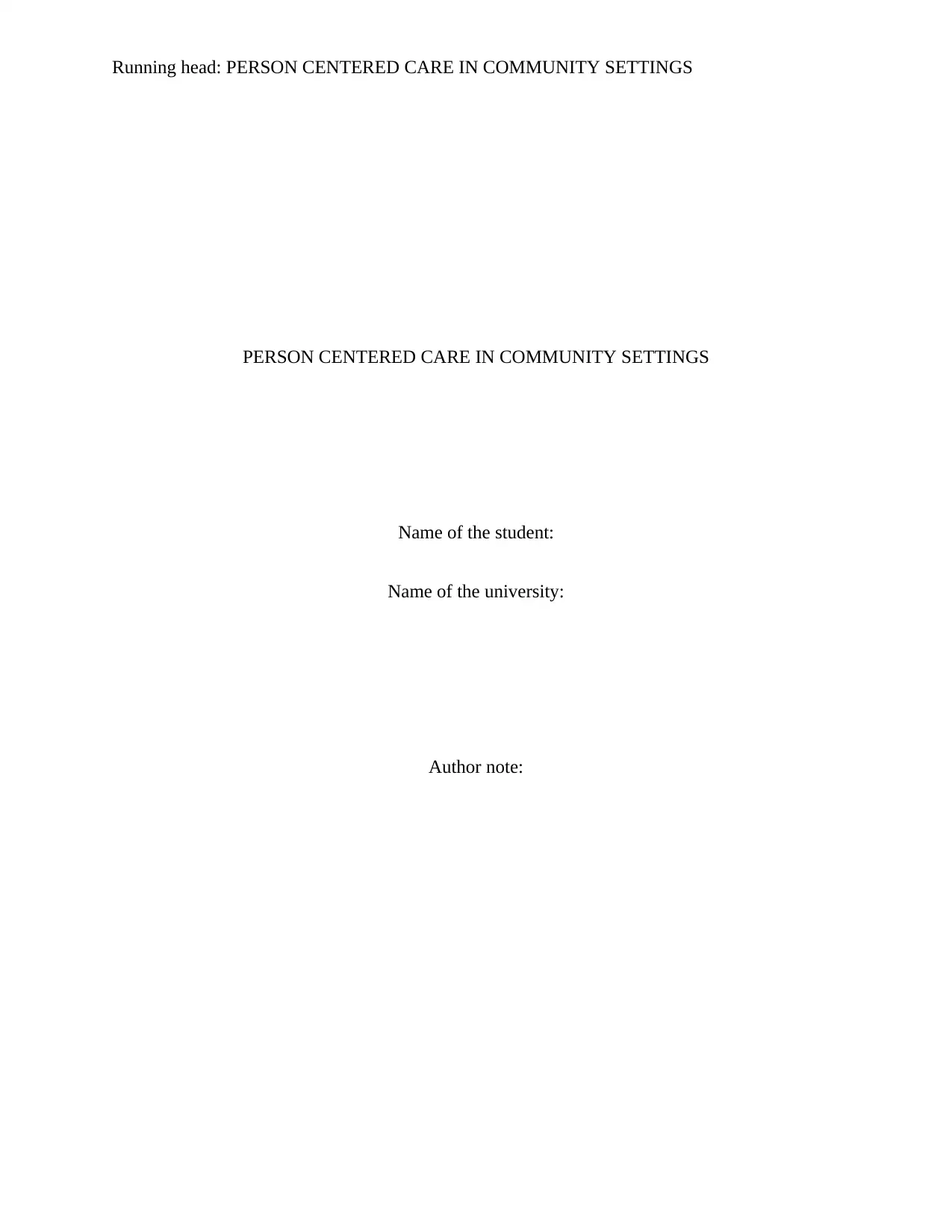
Running head: PERSON CENTERED CARE IN COMMUNITY SETTINGS
PERSON CENTERED CARE IN COMMUNITY SETTINGS
Name of the student:
Name of the university:
Author note:
PERSON CENTERED CARE IN COMMUNITY SETTINGS
Name of the student:
Name of the university:
Author note:
Paraphrase This Document
Need a fresh take? Get an instant paraphrase of this document with our AI Paraphraser
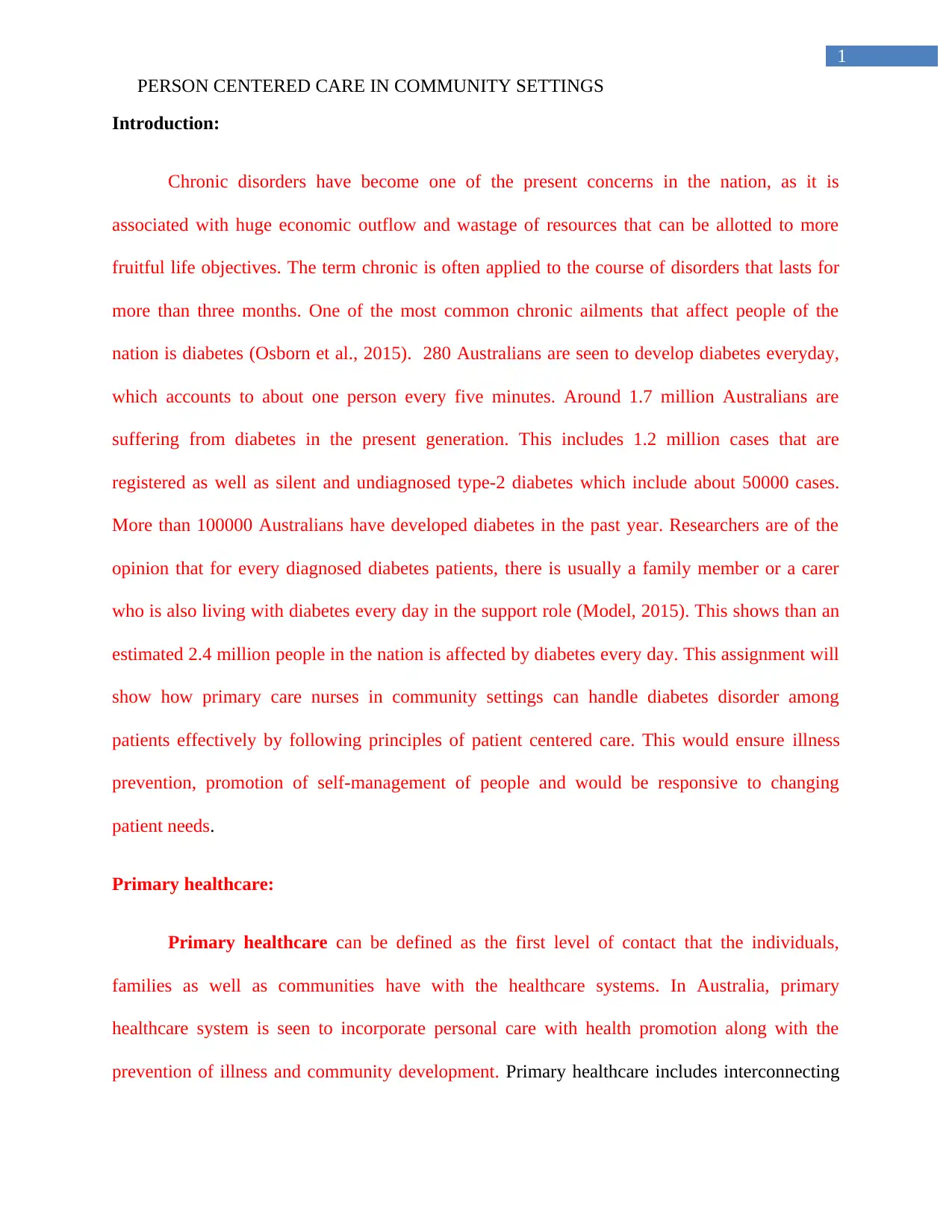
1
PERSON CENTERED CARE IN COMMUNITY SETTINGS
Introduction:
Chronic disorders have become one of the present concerns in the nation, as it is
associated with huge economic outflow and wastage of resources that can be allotted to more
fruitful life objectives. The term chronic is often applied to the course of disorders that lasts for
more than three months. One of the most common chronic ailments that affect people of the
nation is diabetes (Osborn et al., 2015). 280 Australians are seen to develop diabetes everyday,
which accounts to about one person every five minutes. Around 1.7 million Australians are
suffering from diabetes in the present generation. This includes 1.2 million cases that are
registered as well as silent and undiagnosed type-2 diabetes which include about 50000 cases.
More than 100000 Australians have developed diabetes in the past year. Researchers are of the
opinion that for every diagnosed diabetes patients, there is usually a family member or a carer
who is also living with diabetes every day in the support role (Model, 2015). This shows than an
estimated 2.4 million people in the nation is affected by diabetes every day. This assignment will
show how primary care nurses in community settings can handle diabetes disorder among
patients effectively by following principles of patient centered care. This would ensure illness
prevention, promotion of self-management of people and would be responsive to changing
patient needs.
Primary healthcare:
Primary healthcare can be defined as the first level of contact that the individuals,
families as well as communities have with the healthcare systems. In Australia, primary
healthcare system is seen to incorporate personal care with health promotion along with the
prevention of illness and community development. Primary healthcare includes interconnecting
PERSON CENTERED CARE IN COMMUNITY SETTINGS
Introduction:
Chronic disorders have become one of the present concerns in the nation, as it is
associated with huge economic outflow and wastage of resources that can be allotted to more
fruitful life objectives. The term chronic is often applied to the course of disorders that lasts for
more than three months. One of the most common chronic ailments that affect people of the
nation is diabetes (Osborn et al., 2015). 280 Australians are seen to develop diabetes everyday,
which accounts to about one person every five minutes. Around 1.7 million Australians are
suffering from diabetes in the present generation. This includes 1.2 million cases that are
registered as well as silent and undiagnosed type-2 diabetes which include about 50000 cases.
More than 100000 Australians have developed diabetes in the past year. Researchers are of the
opinion that for every diagnosed diabetes patients, there is usually a family member or a carer
who is also living with diabetes every day in the support role (Model, 2015). This shows than an
estimated 2.4 million people in the nation is affected by diabetes every day. This assignment will
show how primary care nurses in community settings can handle diabetes disorder among
patients effectively by following principles of patient centered care. This would ensure illness
prevention, promotion of self-management of people and would be responsive to changing
patient needs.
Primary healthcare:
Primary healthcare can be defined as the first level of contact that the individuals,
families as well as communities have with the healthcare systems. In Australia, primary
healthcare system is seen to incorporate personal care with health promotion along with the
prevention of illness and community development. Primary healthcare includes interconnecting
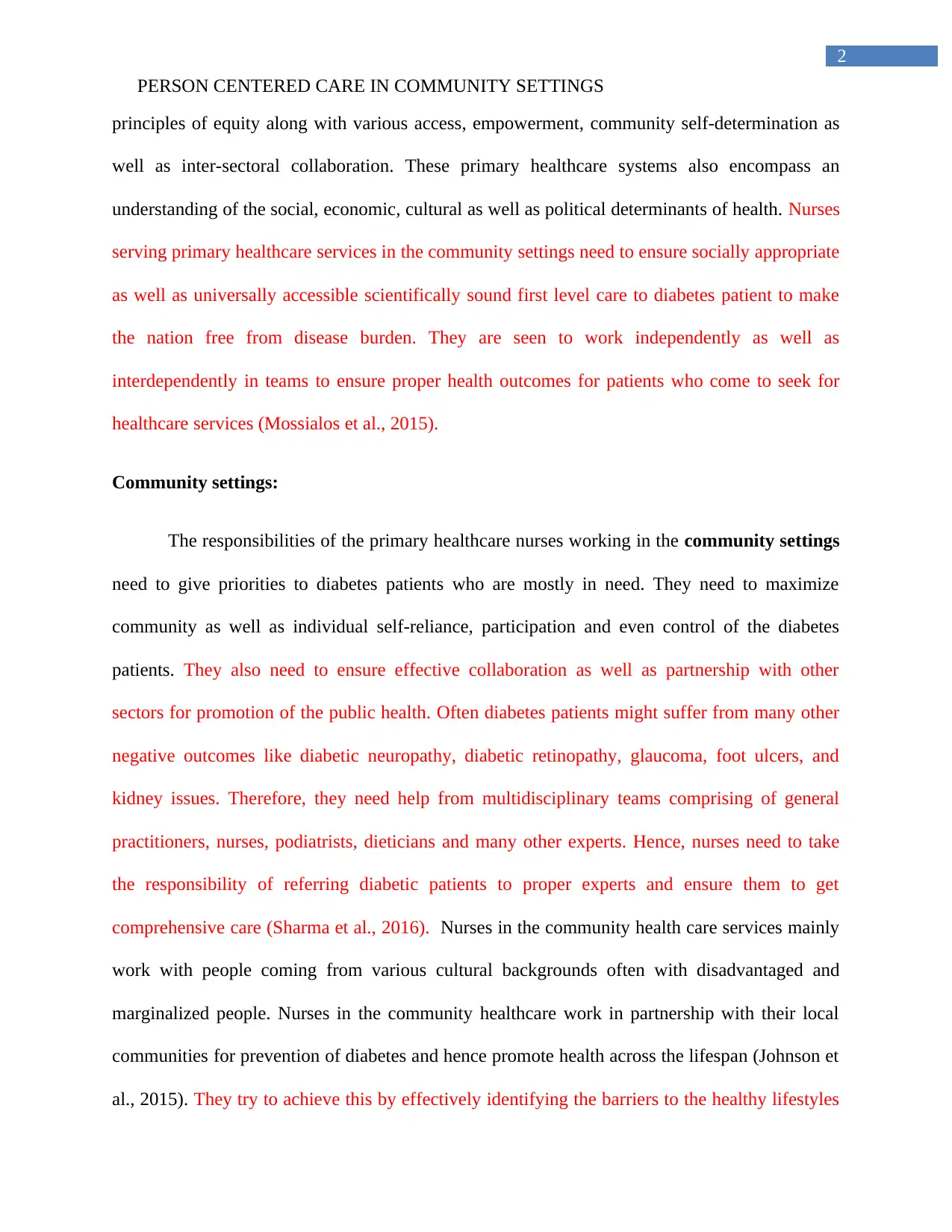
2
PERSON CENTERED CARE IN COMMUNITY SETTINGS
principles of equity along with various access, empowerment, community self-determination as
well as inter-sectoral collaboration. These primary healthcare systems also encompass an
understanding of the social, economic, cultural as well as political determinants of health. Nurses
serving primary healthcare services in the community settings need to ensure socially appropriate
as well as universally accessible scientifically sound first level care to diabetes patient to make
the nation free from disease burden. They are seen to work independently as well as
interdependently in teams to ensure proper health outcomes for patients who come to seek for
healthcare services (Mossialos et al., 2015).
Community settings:
The responsibilities of the primary healthcare nurses working in the community settings
need to give priorities to diabetes patients who are mostly in need. They need to maximize
community as well as individual self-reliance, participation and even control of the diabetes
patients. They also need to ensure effective collaboration as well as partnership with other
sectors for promotion of the public health. Often diabetes patients might suffer from many other
negative outcomes like diabetic neuropathy, diabetic retinopathy, glaucoma, foot ulcers, and
kidney issues. Therefore, they need help from multidisciplinary teams comprising of general
practitioners, nurses, podiatrists, dieticians and many other experts. Hence, nurses need to take
the responsibility of referring diabetic patients to proper experts and ensure them to get
comprehensive care (Sharma et al., 2016). Nurses in the community health care services mainly
work with people coming from various cultural backgrounds often with disadvantaged and
marginalized people. Nurses in the community healthcare work in partnership with their local
communities for prevention of diabetes and hence promote health across the lifespan (Johnson et
al., 2015). They try to achieve this by effectively identifying the barriers to the healthy lifestyles
PERSON CENTERED CARE IN COMMUNITY SETTINGS
principles of equity along with various access, empowerment, community self-determination as
well as inter-sectoral collaboration. These primary healthcare systems also encompass an
understanding of the social, economic, cultural as well as political determinants of health. Nurses
serving primary healthcare services in the community settings need to ensure socially appropriate
as well as universally accessible scientifically sound first level care to diabetes patient to make
the nation free from disease burden. They are seen to work independently as well as
interdependently in teams to ensure proper health outcomes for patients who come to seek for
healthcare services (Mossialos et al., 2015).
Community settings:
The responsibilities of the primary healthcare nurses working in the community settings
need to give priorities to diabetes patients who are mostly in need. They need to maximize
community as well as individual self-reliance, participation and even control of the diabetes
patients. They also need to ensure effective collaboration as well as partnership with other
sectors for promotion of the public health. Often diabetes patients might suffer from many other
negative outcomes like diabetic neuropathy, diabetic retinopathy, glaucoma, foot ulcers, and
kidney issues. Therefore, they need help from multidisciplinary teams comprising of general
practitioners, nurses, podiatrists, dieticians and many other experts. Hence, nurses need to take
the responsibility of referring diabetic patients to proper experts and ensure them to get
comprehensive care (Sharma et al., 2016). Nurses in the community health care services mainly
work with people coming from various cultural backgrounds often with disadvantaged and
marginalized people. Nurses in the community healthcare work in partnership with their local
communities for prevention of diabetes and hence promote health across the lifespan (Johnson et
al., 2015). They try to achieve this by effectively identifying the barriers to the healthy lifestyles
⊘ This is a preview!⊘
Do you want full access?
Subscribe today to unlock all pages.

Trusted by 1+ million students worldwide
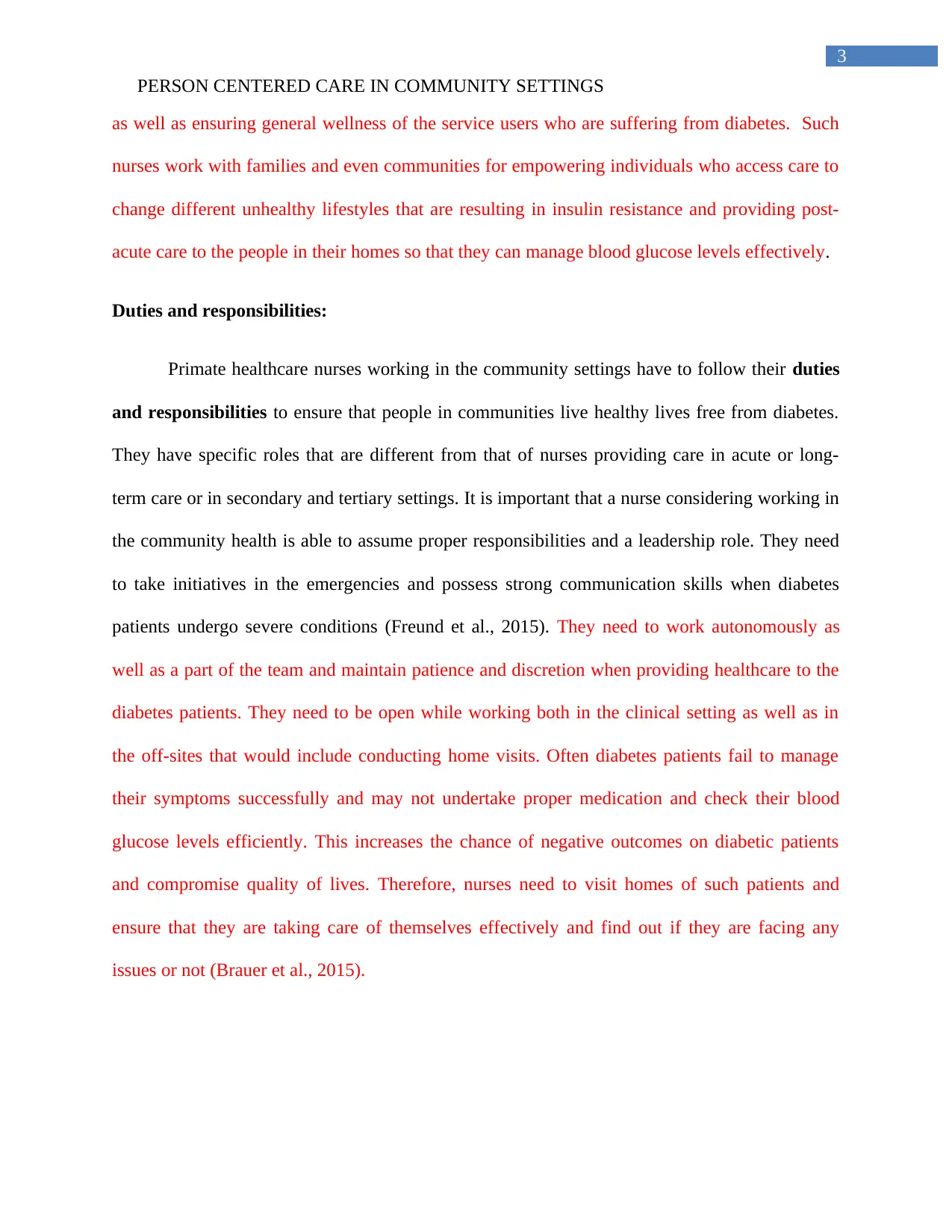
3
PERSON CENTERED CARE IN COMMUNITY SETTINGS
as well as ensuring general wellness of the service users who are suffering from diabetes. Such
nurses work with families and even communities for empowering individuals who access care to
change different unhealthy lifestyles that are resulting in insulin resistance and providing post-
acute care to the people in their homes so that they can manage blood glucose levels effectively.
Duties and responsibilities:
Primate healthcare nurses working in the community settings have to follow their duties
and responsibilities to ensure that people in communities live healthy lives free from diabetes.
They have specific roles that are different from that of nurses providing care in acute or long-
term care or in secondary and tertiary settings. It is important that a nurse considering working in
the community health is able to assume proper responsibilities and a leadership role. They need
to take initiatives in the emergencies and possess strong communication skills when diabetes
patients undergo severe conditions (Freund et al., 2015). They need to work autonomously as
well as a part of the team and maintain patience and discretion when providing healthcare to the
diabetes patients. They need to be open while working both in the clinical setting as well as in
the off-sites that would include conducting home visits. Often diabetes patients fail to manage
their symptoms successfully and may not undertake proper medication and check their blood
glucose levels efficiently. This increases the chance of negative outcomes on diabetic patients
and compromise quality of lives. Therefore, nurses need to visit homes of such patients and
ensure that they are taking care of themselves effectively and find out if they are facing any
issues or not (Brauer et al., 2015).
PERSON CENTERED CARE IN COMMUNITY SETTINGS
as well as ensuring general wellness of the service users who are suffering from diabetes. Such
nurses work with families and even communities for empowering individuals who access care to
change different unhealthy lifestyles that are resulting in insulin resistance and providing post-
acute care to the people in their homes so that they can manage blood glucose levels effectively.
Duties and responsibilities:
Primate healthcare nurses working in the community settings have to follow their duties
and responsibilities to ensure that people in communities live healthy lives free from diabetes.
They have specific roles that are different from that of nurses providing care in acute or long-
term care or in secondary and tertiary settings. It is important that a nurse considering working in
the community health is able to assume proper responsibilities and a leadership role. They need
to take initiatives in the emergencies and possess strong communication skills when diabetes
patients undergo severe conditions (Freund et al., 2015). They need to work autonomously as
well as a part of the team and maintain patience and discretion when providing healthcare to the
diabetes patients. They need to be open while working both in the clinical setting as well as in
the off-sites that would include conducting home visits. Often diabetes patients fail to manage
their symptoms successfully and may not undertake proper medication and check their blood
glucose levels efficiently. This increases the chance of negative outcomes on diabetic patients
and compromise quality of lives. Therefore, nurses need to visit homes of such patients and
ensure that they are taking care of themselves effectively and find out if they are facing any
issues or not (Brauer et al., 2015).
Paraphrase This Document
Need a fresh take? Get an instant paraphrase of this document with our AI Paraphraser
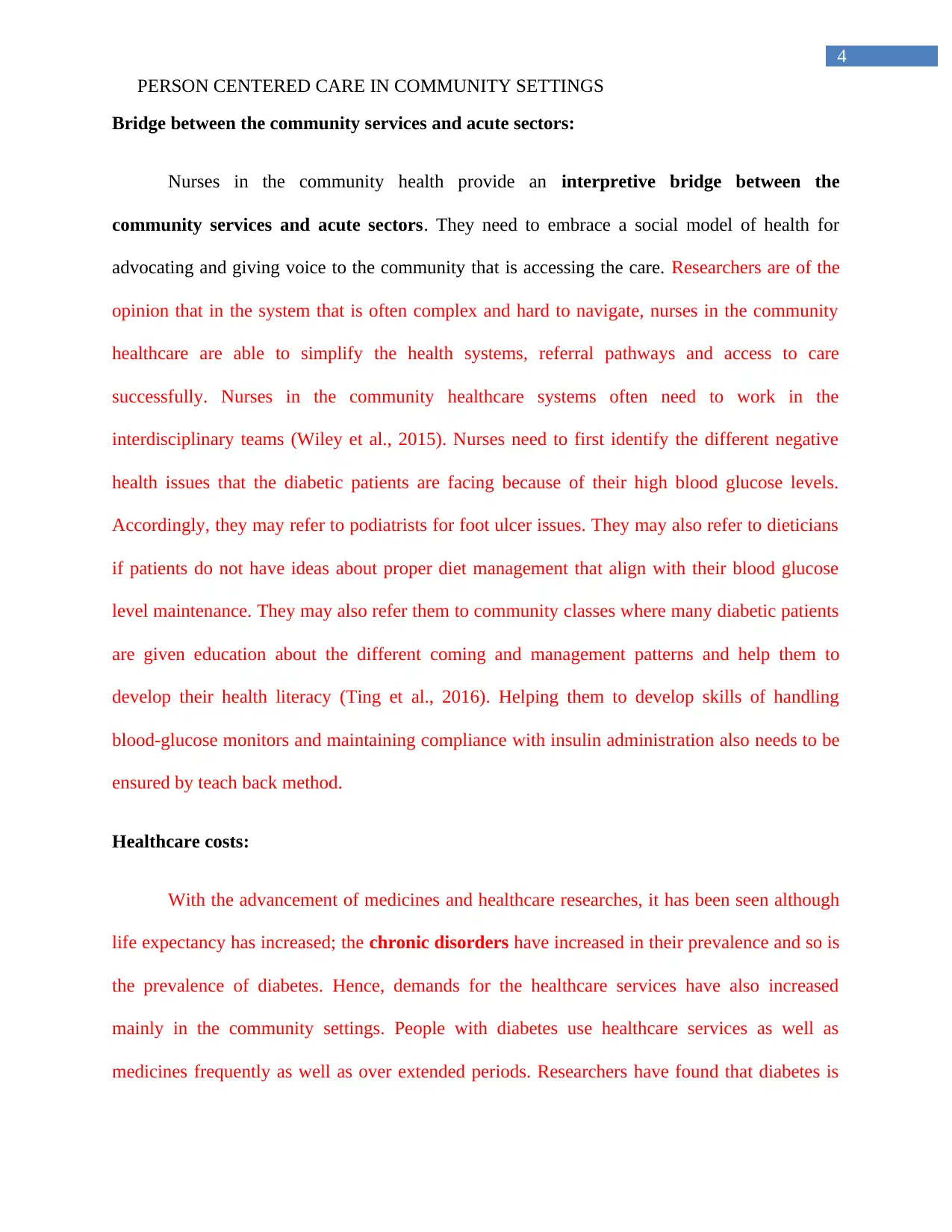
4
PERSON CENTERED CARE IN COMMUNITY SETTINGS
Bridge between the community services and acute sectors:
Nurses in the community health provide an interpretive bridge between the
community services and acute sectors. They need to embrace a social model of health for
advocating and giving voice to the community that is accessing the care. Researchers are of the
opinion that in the system that is often complex and hard to navigate, nurses in the community
healthcare are able to simplify the health systems, referral pathways and access to care
successfully. Nurses in the community healthcare systems often need to work in the
interdisciplinary teams (Wiley et al., 2015). Nurses need to first identify the different negative
health issues that the diabetic patients are facing because of their high blood glucose levels.
Accordingly, they may refer to podiatrists for foot ulcer issues. They may also refer to dieticians
if patients do not have ideas about proper diet management that align with their blood glucose
level maintenance. They may also refer them to community classes where many diabetic patients
are given education about the different coming and management patterns and help them to
develop their health literacy (Ting et al., 2016). Helping them to develop skills of handling
blood-glucose monitors and maintaining compliance with insulin administration also needs to be
ensured by teach back method.
Healthcare costs:
With the advancement of medicines and healthcare researches, it has been seen although
life expectancy has increased; the chronic disorders have increased in their prevalence and so is
the prevalence of diabetes. Hence, demands for the healthcare services have also increased
mainly in the community settings. People with diabetes use healthcare services as well as
medicines frequently as well as over extended periods. Researchers have found that diabetes is
PERSON CENTERED CARE IN COMMUNITY SETTINGS
Bridge between the community services and acute sectors:
Nurses in the community health provide an interpretive bridge between the
community services and acute sectors. They need to embrace a social model of health for
advocating and giving voice to the community that is accessing the care. Researchers are of the
opinion that in the system that is often complex and hard to navigate, nurses in the community
healthcare are able to simplify the health systems, referral pathways and access to care
successfully. Nurses in the community healthcare systems often need to work in the
interdisciplinary teams (Wiley et al., 2015). Nurses need to first identify the different negative
health issues that the diabetic patients are facing because of their high blood glucose levels.
Accordingly, they may refer to podiatrists for foot ulcer issues. They may also refer to dieticians
if patients do not have ideas about proper diet management that align with their blood glucose
level maintenance. They may also refer them to community classes where many diabetic patients
are given education about the different coming and management patterns and help them to
develop their health literacy (Ting et al., 2016). Helping them to develop skills of handling
blood-glucose monitors and maintaining compliance with insulin administration also needs to be
ensured by teach back method.
Healthcare costs:
With the advancement of medicines and healthcare researches, it has been seen although
life expectancy has increased; the chronic disorders have increased in their prevalence and so is
the prevalence of diabetes. Hence, demands for the healthcare services have also increased
mainly in the community settings. People with diabetes use healthcare services as well as
medicines frequently as well as over extended periods. Researchers have found that diabetes is
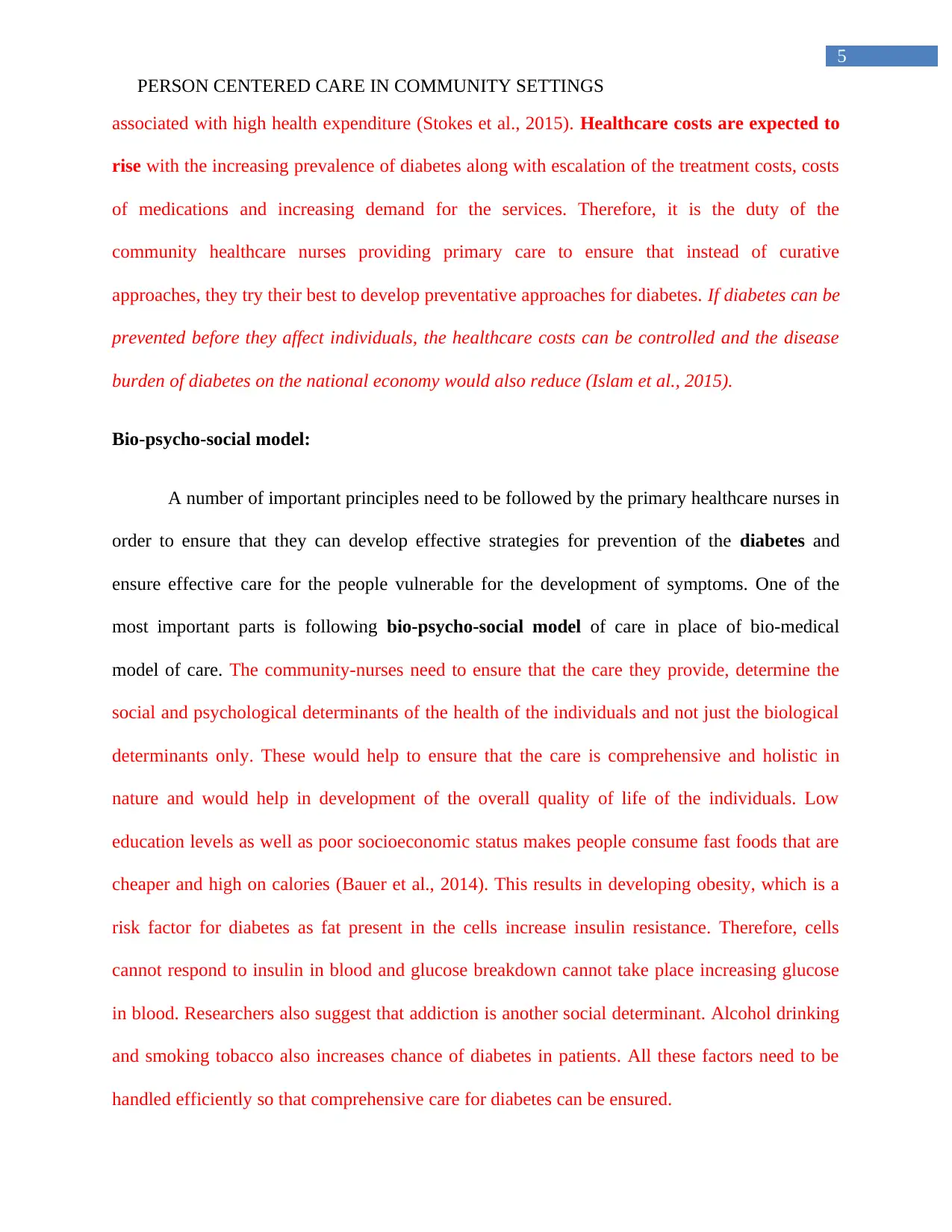
5
PERSON CENTERED CARE IN COMMUNITY SETTINGS
associated with high health expenditure (Stokes et al., 2015). Healthcare costs are expected to
rise with the increasing prevalence of diabetes along with escalation of the treatment costs, costs
of medications and increasing demand for the services. Therefore, it is the duty of the
community healthcare nurses providing primary care to ensure that instead of curative
approaches, they try their best to develop preventative approaches for diabetes. If diabetes can be
prevented before they affect individuals, the healthcare costs can be controlled and the disease
burden of diabetes on the national economy would also reduce (Islam et al., 2015).
Bio-psycho-social model:
A number of important principles need to be followed by the primary healthcare nurses in
order to ensure that they can develop effective strategies for prevention of the diabetes and
ensure effective care for the people vulnerable for the development of symptoms. One of the
most important parts is following bio-psycho-social model of care in place of bio-medical
model of care. The community-nurses need to ensure that the care they provide, determine the
social and psychological determinants of the health of the individuals and not just the biological
determinants only. These would help to ensure that the care is comprehensive and holistic in
nature and would help in development of the overall quality of life of the individuals. Low
education levels as well as poor socioeconomic status makes people consume fast foods that are
cheaper and high on calories (Bauer et al., 2014). This results in developing obesity, which is a
risk factor for diabetes as fat present in the cells increase insulin resistance. Therefore, cells
cannot respond to insulin in blood and glucose breakdown cannot take place increasing glucose
in blood. Researchers also suggest that addiction is another social determinant. Alcohol drinking
and smoking tobacco also increases chance of diabetes in patients. All these factors need to be
handled efficiently so that comprehensive care for diabetes can be ensured.
PERSON CENTERED CARE IN COMMUNITY SETTINGS
associated with high health expenditure (Stokes et al., 2015). Healthcare costs are expected to
rise with the increasing prevalence of diabetes along with escalation of the treatment costs, costs
of medications and increasing demand for the services. Therefore, it is the duty of the
community healthcare nurses providing primary care to ensure that instead of curative
approaches, they try their best to develop preventative approaches for diabetes. If diabetes can be
prevented before they affect individuals, the healthcare costs can be controlled and the disease
burden of diabetes on the national economy would also reduce (Islam et al., 2015).
Bio-psycho-social model:
A number of important principles need to be followed by the primary healthcare nurses in
order to ensure that they can develop effective strategies for prevention of the diabetes and
ensure effective care for the people vulnerable for the development of symptoms. One of the
most important parts is following bio-psycho-social model of care in place of bio-medical
model of care. The community-nurses need to ensure that the care they provide, determine the
social and psychological determinants of the health of the individuals and not just the biological
determinants only. These would help to ensure that the care is comprehensive and holistic in
nature and would help in development of the overall quality of life of the individuals. Low
education levels as well as poor socioeconomic status makes people consume fast foods that are
cheaper and high on calories (Bauer et al., 2014). This results in developing obesity, which is a
risk factor for diabetes as fat present in the cells increase insulin resistance. Therefore, cells
cannot respond to insulin in blood and glucose breakdown cannot take place increasing glucose
in blood. Researchers also suggest that addiction is another social determinant. Alcohol drinking
and smoking tobacco also increases chance of diabetes in patients. All these factors need to be
handled efficiently so that comprehensive care for diabetes can be ensured.
⊘ This is a preview!⊘
Do you want full access?
Subscribe today to unlock all pages.

Trusted by 1+ million students worldwide
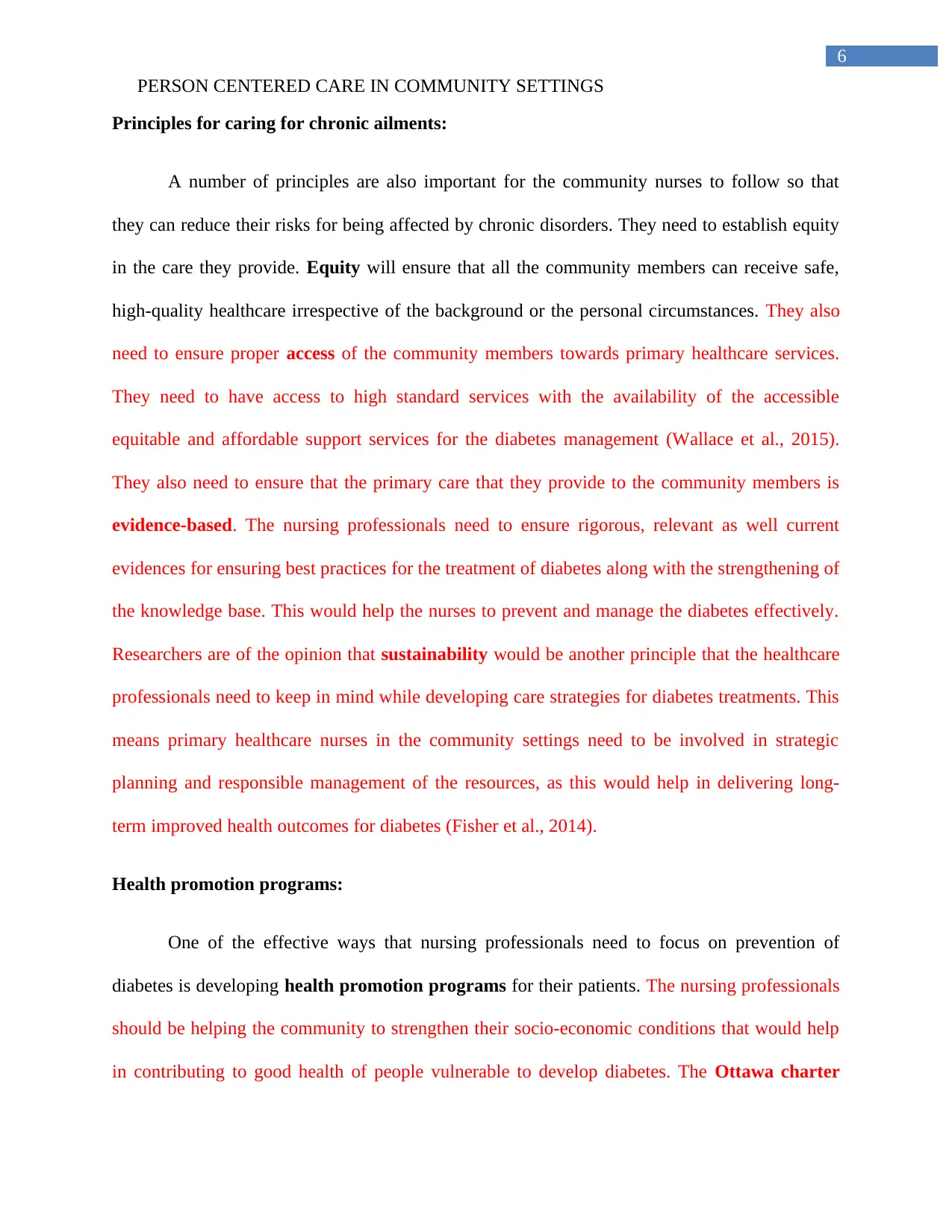
6
PERSON CENTERED CARE IN COMMUNITY SETTINGS
Principles for caring for chronic ailments:
A number of principles are also important for the community nurses to follow so that
they can reduce their risks for being affected by chronic disorders. They need to establish equity
in the care they provide. Equity will ensure that all the community members can receive safe,
high-quality healthcare irrespective of the background or the personal circumstances. They also
need to ensure proper access of the community members towards primary healthcare services.
They need to have access to high standard services with the availability of the accessible
equitable and affordable support services for the diabetes management (Wallace et al., 2015).
They also need to ensure that the primary care that they provide to the community members is
evidence-based. The nursing professionals need to ensure rigorous, relevant as well current
evidences for ensuring best practices for the treatment of diabetes along with the strengthening of
the knowledge base. This would help the nurses to prevent and manage the diabetes effectively.
Researchers are of the opinion that sustainability would be another principle that the healthcare
professionals need to keep in mind while developing care strategies for diabetes treatments. This
means primary healthcare nurses in the community settings need to be involved in strategic
planning and responsible management of the resources, as this would help in delivering long-
term improved health outcomes for diabetes (Fisher et al., 2014).
Health promotion programs:
One of the effective ways that nursing professionals need to focus on prevention of
diabetes is developing health promotion programs for their patients. The nursing professionals
should be helping the community to strengthen their socio-economic conditions that would help
in contributing to good health of people vulnerable to develop diabetes. The Ottawa charter
PERSON CENTERED CARE IN COMMUNITY SETTINGS
Principles for caring for chronic ailments:
A number of principles are also important for the community nurses to follow so that
they can reduce their risks for being affected by chronic disorders. They need to establish equity
in the care they provide. Equity will ensure that all the community members can receive safe,
high-quality healthcare irrespective of the background or the personal circumstances. They also
need to ensure proper access of the community members towards primary healthcare services.
They need to have access to high standard services with the availability of the accessible
equitable and affordable support services for the diabetes management (Wallace et al., 2015).
They also need to ensure that the primary care that they provide to the community members is
evidence-based. The nursing professionals need to ensure rigorous, relevant as well current
evidences for ensuring best practices for the treatment of diabetes along with the strengthening of
the knowledge base. This would help the nurses to prevent and manage the diabetes effectively.
Researchers are of the opinion that sustainability would be another principle that the healthcare
professionals need to keep in mind while developing care strategies for diabetes treatments. This
means primary healthcare nurses in the community settings need to be involved in strategic
planning and responsible management of the resources, as this would help in delivering long-
term improved health outcomes for diabetes (Fisher et al., 2014).
Health promotion programs:
One of the effective ways that nursing professionals need to focus on prevention of
diabetes is developing health promotion programs for their patients. The nursing professionals
should be helping the community to strengthen their socio-economic conditions that would help
in contributing to good health of people vulnerable to develop diabetes. The Ottawa charter
Paraphrase This Document
Need a fresh take? Get an instant paraphrase of this document with our AI Paraphraser
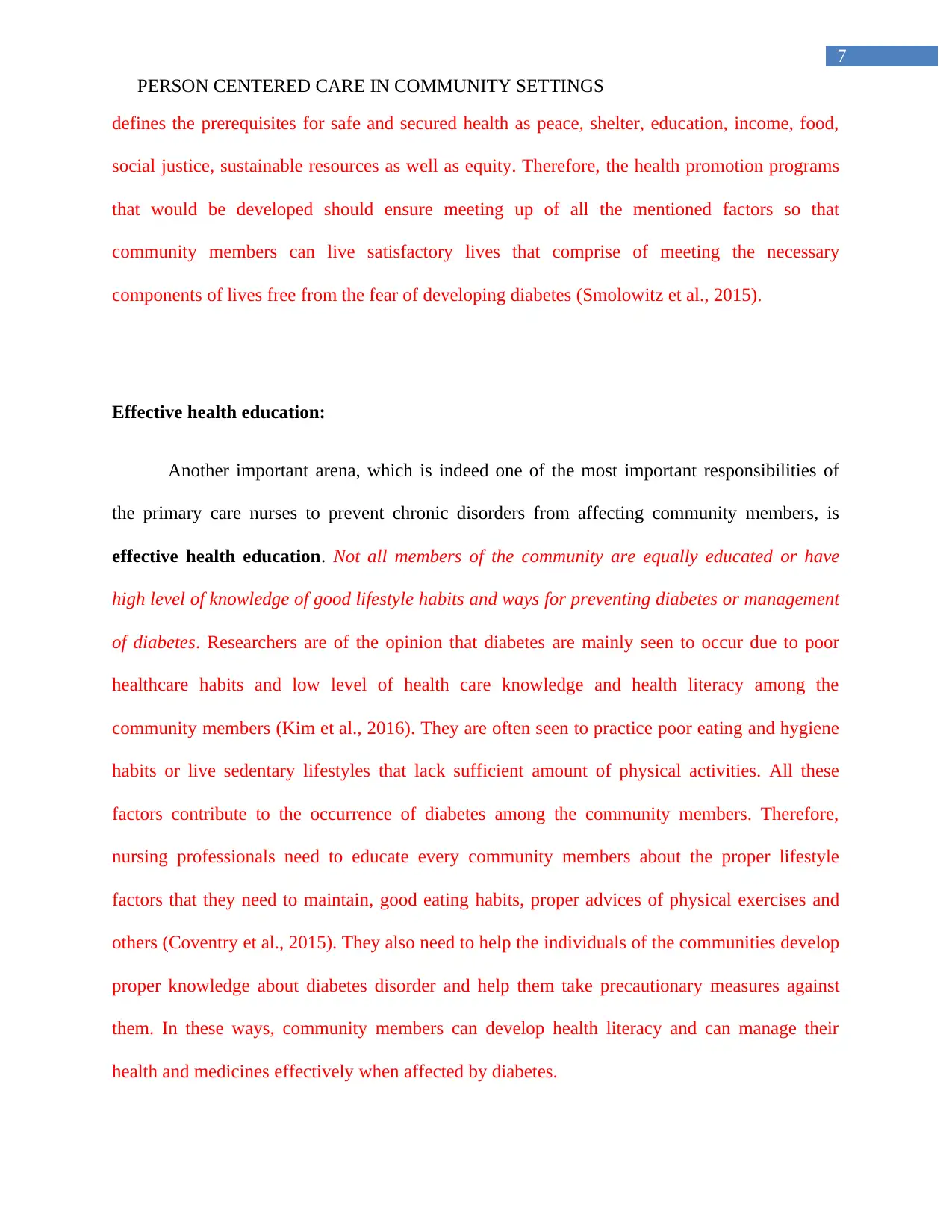
7
PERSON CENTERED CARE IN COMMUNITY SETTINGS
defines the prerequisites for safe and secured health as peace, shelter, education, income, food,
social justice, sustainable resources as well as equity. Therefore, the health promotion programs
that would be developed should ensure meeting up of all the mentioned factors so that
community members can live satisfactory lives that comprise of meeting the necessary
components of lives free from the fear of developing diabetes (Smolowitz et al., 2015).
Effective health education:
Another important arena, which is indeed one of the most important responsibilities of
the primary care nurses to prevent chronic disorders from affecting community members, is
effective health education. Not all members of the community are equally educated or have
high level of knowledge of good lifestyle habits and ways for preventing diabetes or management
of diabetes. Researchers are of the opinion that diabetes are mainly seen to occur due to poor
healthcare habits and low level of health care knowledge and health literacy among the
community members (Kim et al., 2016). They are often seen to practice poor eating and hygiene
habits or live sedentary lifestyles that lack sufficient amount of physical activities. All these
factors contribute to the occurrence of diabetes among the community members. Therefore,
nursing professionals need to educate every community members about the proper lifestyle
factors that they need to maintain, good eating habits, proper advices of physical exercises and
others (Coventry et al., 2015). They also need to help the individuals of the communities develop
proper knowledge about diabetes disorder and help them take precautionary measures against
them. In these ways, community members can develop health literacy and can manage their
health and medicines effectively when affected by diabetes.
PERSON CENTERED CARE IN COMMUNITY SETTINGS
defines the prerequisites for safe and secured health as peace, shelter, education, income, food,
social justice, sustainable resources as well as equity. Therefore, the health promotion programs
that would be developed should ensure meeting up of all the mentioned factors so that
community members can live satisfactory lives that comprise of meeting the necessary
components of lives free from the fear of developing diabetes (Smolowitz et al., 2015).
Effective health education:
Another important arena, which is indeed one of the most important responsibilities of
the primary care nurses to prevent chronic disorders from affecting community members, is
effective health education. Not all members of the community are equally educated or have
high level of knowledge of good lifestyle habits and ways for preventing diabetes or management
of diabetes. Researchers are of the opinion that diabetes are mainly seen to occur due to poor
healthcare habits and low level of health care knowledge and health literacy among the
community members (Kim et al., 2016). They are often seen to practice poor eating and hygiene
habits or live sedentary lifestyles that lack sufficient amount of physical activities. All these
factors contribute to the occurrence of diabetes among the community members. Therefore,
nursing professionals need to educate every community members about the proper lifestyle
factors that they need to maintain, good eating habits, proper advices of physical exercises and
others (Coventry et al., 2015). They also need to help the individuals of the communities develop
proper knowledge about diabetes disorder and help them take precautionary measures against
them. In these ways, community members can develop health literacy and can manage their
health and medicines effectively when affected by diabetes.
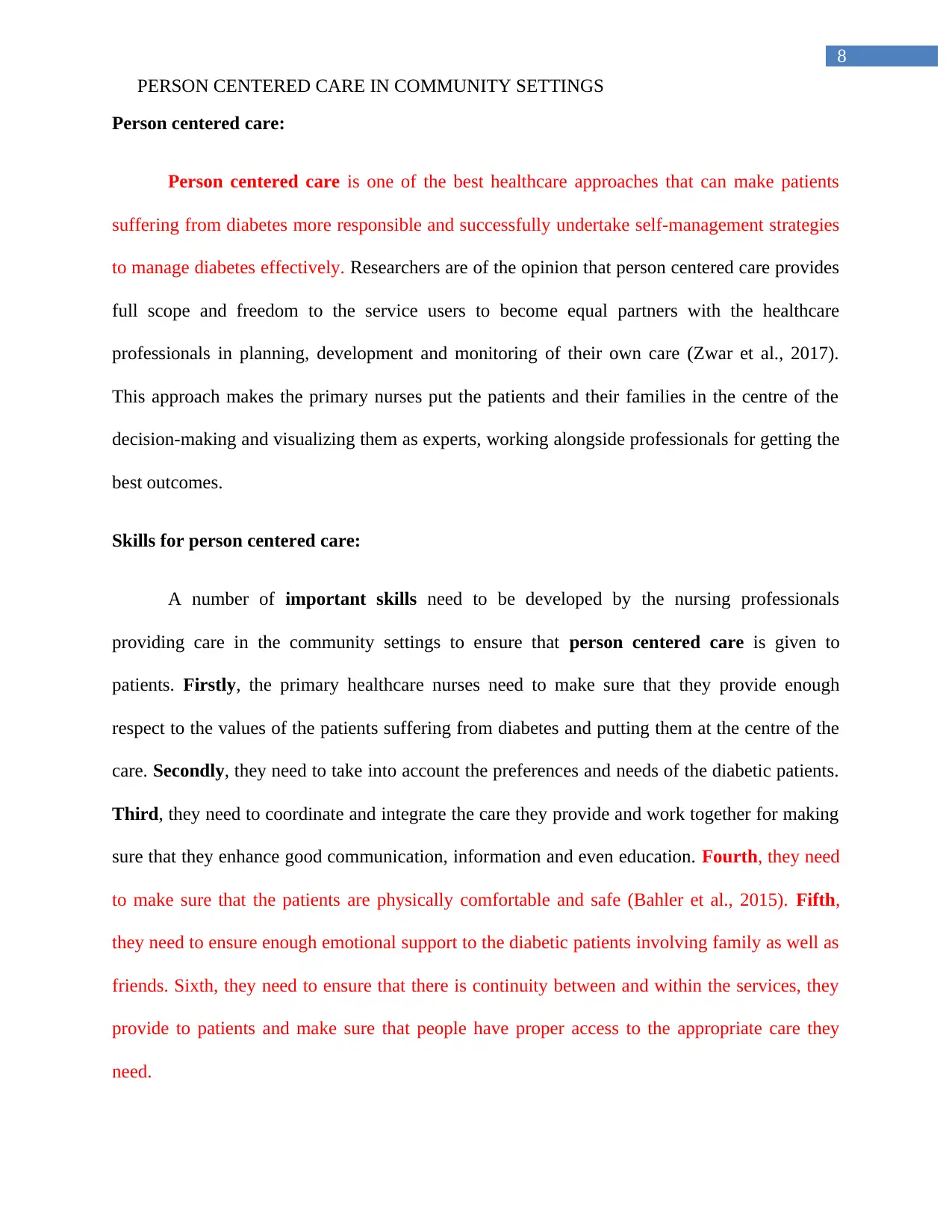
8
PERSON CENTERED CARE IN COMMUNITY SETTINGS
Person centered care:
Person centered care is one of the best healthcare approaches that can make patients
suffering from diabetes more responsible and successfully undertake self-management strategies
to manage diabetes effectively. Researchers are of the opinion that person centered care provides
full scope and freedom to the service users to become equal partners with the healthcare
professionals in planning, development and monitoring of their own care (Zwar et al., 2017).
This approach makes the primary nurses put the patients and their families in the centre of the
decision-making and visualizing them as experts, working alongside professionals for getting the
best outcomes.
Skills for person centered care:
A number of important skills need to be developed by the nursing professionals
providing care in the community settings to ensure that person centered care is given to
patients. Firstly, the primary healthcare nurses need to make sure that they provide enough
respect to the values of the patients suffering from diabetes and putting them at the centre of the
care. Secondly, they need to take into account the preferences and needs of the diabetic patients.
Third, they need to coordinate and integrate the care they provide and work together for making
sure that they enhance good communication, information and even education. Fourth, they need
to make sure that the patients are physically comfortable and safe (Bahler et al., 2015). Fifth,
they need to ensure enough emotional support to the diabetic patients involving family as well as
friends. Sixth, they need to ensure that there is continuity between and within the services, they
provide to patients and make sure that people have proper access to the appropriate care they
need.
PERSON CENTERED CARE IN COMMUNITY SETTINGS
Person centered care:
Person centered care is one of the best healthcare approaches that can make patients
suffering from diabetes more responsible and successfully undertake self-management strategies
to manage diabetes effectively. Researchers are of the opinion that person centered care provides
full scope and freedom to the service users to become equal partners with the healthcare
professionals in planning, development and monitoring of their own care (Zwar et al., 2017).
This approach makes the primary nurses put the patients and their families in the centre of the
decision-making and visualizing them as experts, working alongside professionals for getting the
best outcomes.
Skills for person centered care:
A number of important skills need to be developed by the nursing professionals
providing care in the community settings to ensure that person centered care is given to
patients. Firstly, the primary healthcare nurses need to make sure that they provide enough
respect to the values of the patients suffering from diabetes and putting them at the centre of the
care. Secondly, they need to take into account the preferences and needs of the diabetic patients.
Third, they need to coordinate and integrate the care they provide and work together for making
sure that they enhance good communication, information and even education. Fourth, they need
to make sure that the patients are physically comfortable and safe (Bahler et al., 2015). Fifth,
they need to ensure enough emotional support to the diabetic patients involving family as well as
friends. Sixth, they need to ensure that there is continuity between and within the services, they
provide to patients and make sure that people have proper access to the appropriate care they
need.
⊘ This is a preview!⊘
Do you want full access?
Subscribe today to unlock all pages.

Trusted by 1+ million students worldwide
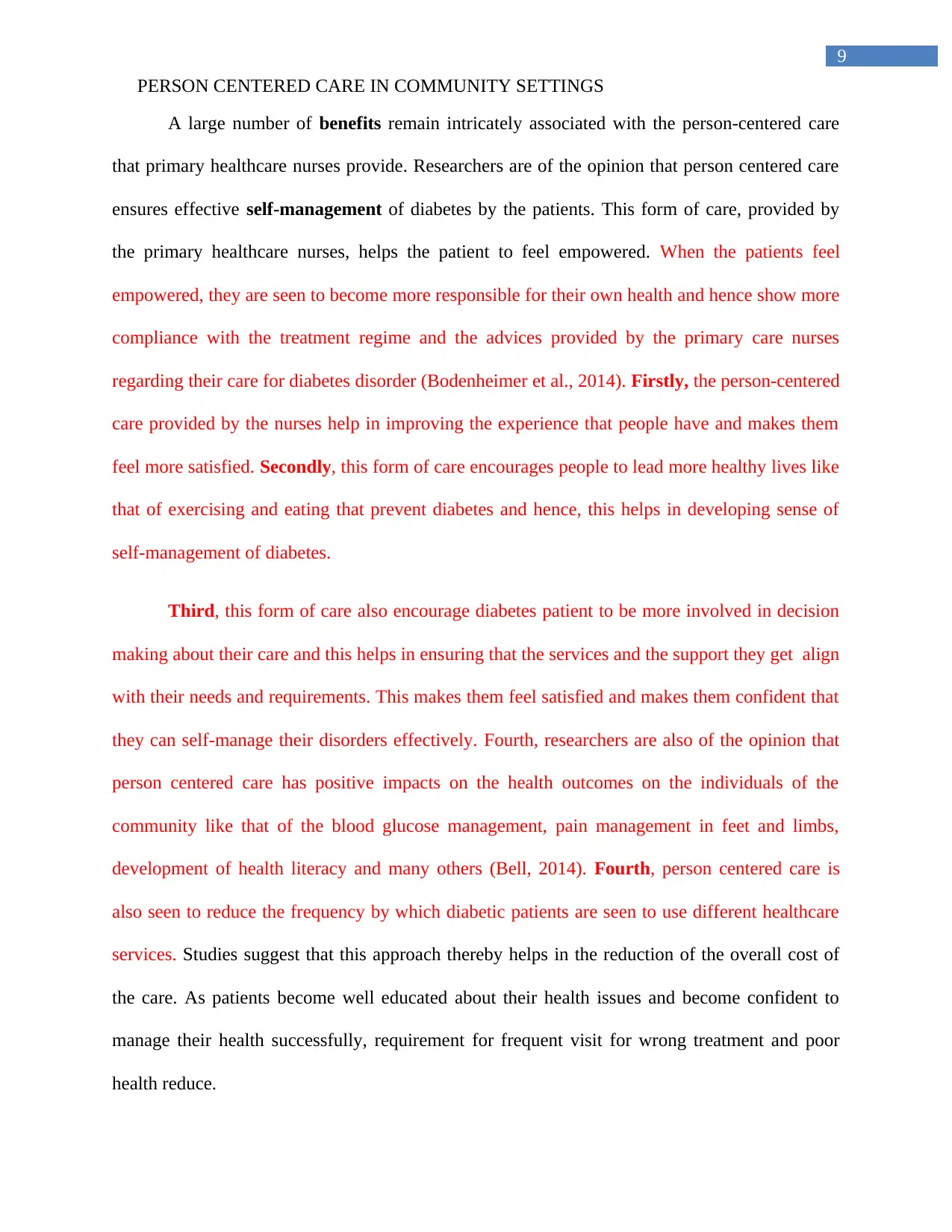
9
PERSON CENTERED CARE IN COMMUNITY SETTINGS
A large number of benefits remain intricately associated with the person-centered care
that primary healthcare nurses provide. Researchers are of the opinion that person centered care
ensures effective self-management of diabetes by the patients. This form of care, provided by
the primary healthcare nurses, helps the patient to feel empowered. When the patients feel
empowered, they are seen to become more responsible for their own health and hence show more
compliance with the treatment regime and the advices provided by the primary care nurses
regarding their care for diabetes disorder (Bodenheimer et al., 2014). Firstly, the person-centered
care provided by the nurses help in improving the experience that people have and makes them
feel more satisfied. Secondly, this form of care encourages people to lead more healthy lives like
that of exercising and eating that prevent diabetes and hence, this helps in developing sense of
self-management of diabetes.
Third, this form of care also encourage diabetes patient to be more involved in decision
making about their care and this helps in ensuring that the services and the support they get align
with their needs and requirements. This makes them feel satisfied and makes them confident that
they can self-manage their disorders effectively. Fourth, researchers are also of the opinion that
person centered care has positive impacts on the health outcomes on the individuals of the
community like that of the blood glucose management, pain management in feet and limbs,
development of health literacy and many others (Bell, 2014). Fourth, person centered care is
also seen to reduce the frequency by which diabetic patients are seen to use different healthcare
services. Studies suggest that this approach thereby helps in the reduction of the overall cost of
the care. As patients become well educated about their health issues and become confident to
manage their health successfully, requirement for frequent visit for wrong treatment and poor
health reduce.
PERSON CENTERED CARE IN COMMUNITY SETTINGS
A large number of benefits remain intricately associated with the person-centered care
that primary healthcare nurses provide. Researchers are of the opinion that person centered care
ensures effective self-management of diabetes by the patients. This form of care, provided by
the primary healthcare nurses, helps the patient to feel empowered. When the patients feel
empowered, they are seen to become more responsible for their own health and hence show more
compliance with the treatment regime and the advices provided by the primary care nurses
regarding their care for diabetes disorder (Bodenheimer et al., 2014). Firstly, the person-centered
care provided by the nurses help in improving the experience that people have and makes them
feel more satisfied. Secondly, this form of care encourages people to lead more healthy lives like
that of exercising and eating that prevent diabetes and hence, this helps in developing sense of
self-management of diabetes.
Third, this form of care also encourage diabetes patient to be more involved in decision
making about their care and this helps in ensuring that the services and the support they get align
with their needs and requirements. This makes them feel satisfied and makes them confident that
they can self-manage their disorders effectively. Fourth, researchers are also of the opinion that
person centered care has positive impacts on the health outcomes on the individuals of the
community like that of the blood glucose management, pain management in feet and limbs,
development of health literacy and many others (Bell, 2014). Fourth, person centered care is
also seen to reduce the frequency by which diabetic patients are seen to use different healthcare
services. Studies suggest that this approach thereby helps in the reduction of the overall cost of
the care. As patients become well educated about their health issues and become confident to
manage their health successfully, requirement for frequent visit for wrong treatment and poor
health reduce.
Paraphrase This Document
Need a fresh take? Get an instant paraphrase of this document with our AI Paraphraser
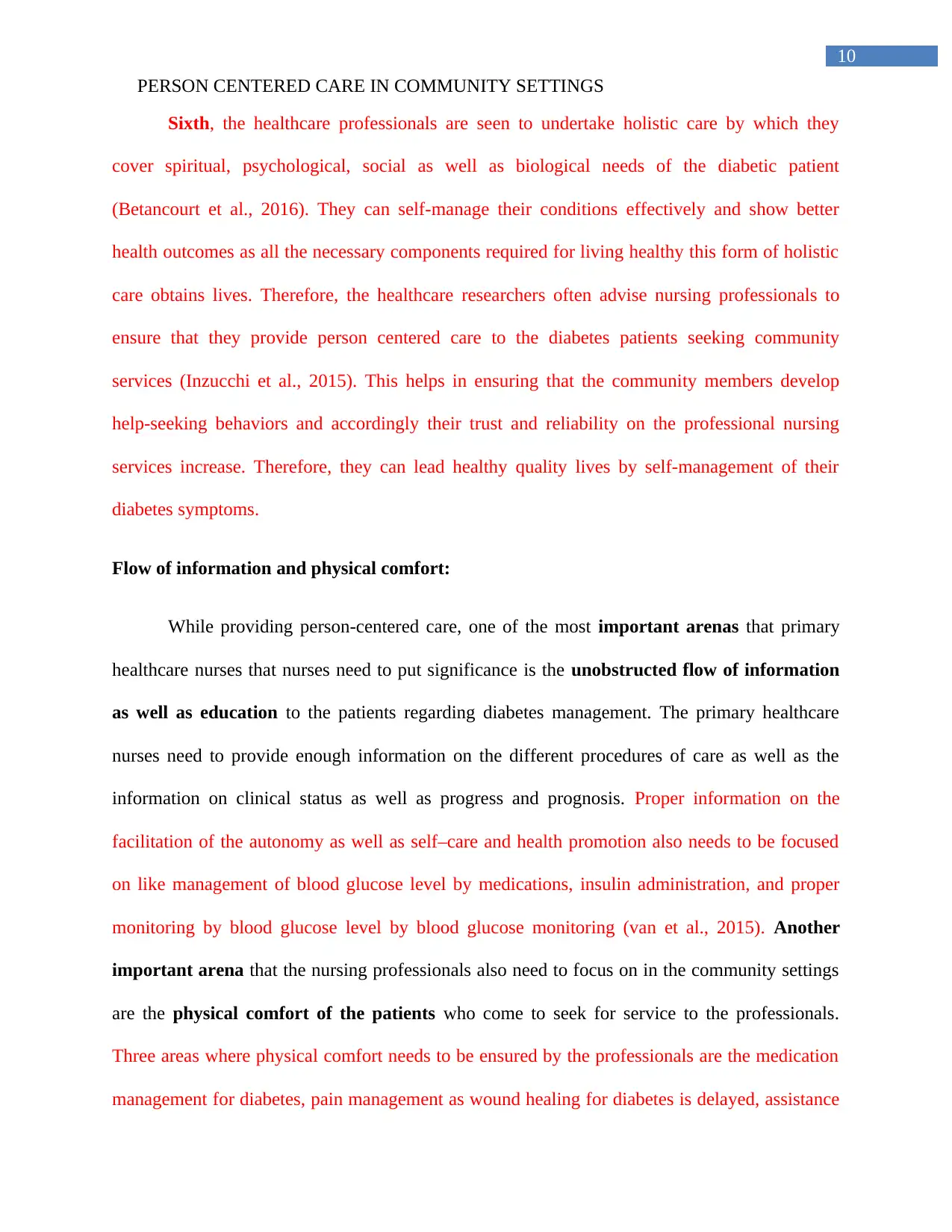
10
PERSON CENTERED CARE IN COMMUNITY SETTINGS
Sixth, the healthcare professionals are seen to undertake holistic care by which they
cover spiritual, psychological, social as well as biological needs of the diabetic patient
(Betancourt et al., 2016). They can self-manage their conditions effectively and show better
health outcomes as all the necessary components required for living healthy this form of holistic
care obtains lives. Therefore, the healthcare researchers often advise nursing professionals to
ensure that they provide person centered care to the diabetes patients seeking community
services (Inzucchi et al., 2015). This helps in ensuring that the community members develop
help-seeking behaviors and accordingly their trust and reliability on the professional nursing
services increase. Therefore, they can lead healthy quality lives by self-management of their
diabetes symptoms.
Flow of information and physical comfort:
While providing person-centered care, one of the most important arenas that primary
healthcare nurses that nurses need to put significance is the unobstructed flow of information
as well as education to the patients regarding diabetes management. The primary healthcare
nurses need to provide enough information on the different procedures of care as well as the
information on clinical status as well as progress and prognosis. Proper information on the
facilitation of the autonomy as well as self–care and health promotion also needs to be focused
on like management of blood glucose level by medications, insulin administration, and proper
monitoring by blood glucose level by blood glucose monitoring (van et al., 2015). Another
important arena that the nursing professionals also need to focus on in the community settings
are the physical comfort of the patients who come to seek for service to the professionals.
Three areas where physical comfort needs to be ensured by the professionals are the medication
management for diabetes, pain management as wound healing for diabetes is delayed, assistance
PERSON CENTERED CARE IN COMMUNITY SETTINGS
Sixth, the healthcare professionals are seen to undertake holistic care by which they
cover spiritual, psychological, social as well as biological needs of the diabetic patient
(Betancourt et al., 2016). They can self-manage their conditions effectively and show better
health outcomes as all the necessary components required for living healthy this form of holistic
care obtains lives. Therefore, the healthcare researchers often advise nursing professionals to
ensure that they provide person centered care to the diabetes patients seeking community
services (Inzucchi et al., 2015). This helps in ensuring that the community members develop
help-seeking behaviors and accordingly their trust and reliability on the professional nursing
services increase. Therefore, they can lead healthy quality lives by self-management of their
diabetes symptoms.
Flow of information and physical comfort:
While providing person-centered care, one of the most important arenas that primary
healthcare nurses that nurses need to put significance is the unobstructed flow of information
as well as education to the patients regarding diabetes management. The primary healthcare
nurses need to provide enough information on the different procedures of care as well as the
information on clinical status as well as progress and prognosis. Proper information on the
facilitation of the autonomy as well as self–care and health promotion also needs to be focused
on like management of blood glucose level by medications, insulin administration, and proper
monitoring by blood glucose level by blood glucose monitoring (van et al., 2015). Another
important arena that the nursing professionals also need to focus on in the community settings
are the physical comfort of the patients who come to seek for service to the professionals.
Three areas where physical comfort needs to be ensured by the professionals are the medication
management for diabetes, pain management as wound healing for diabetes is delayed, assistance
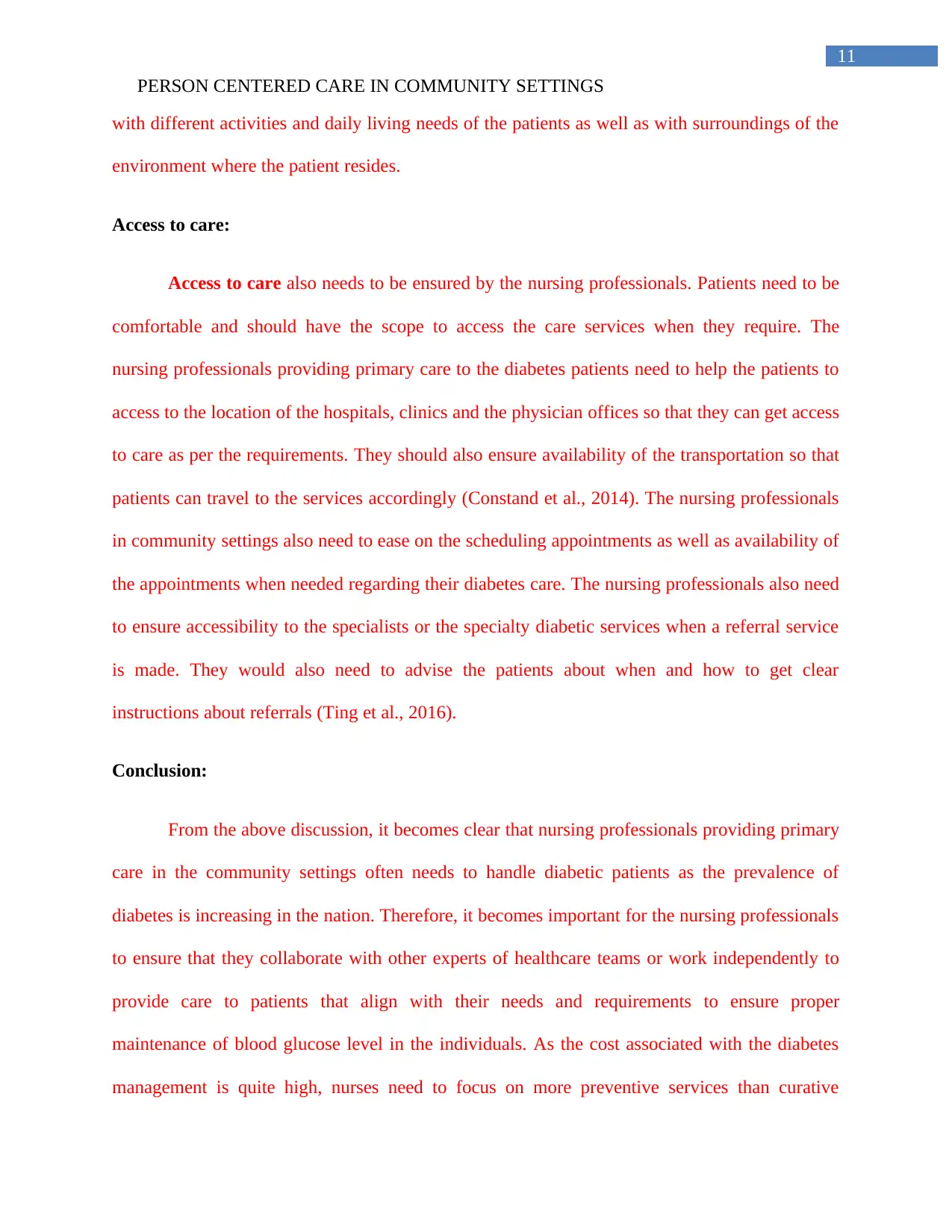
11
PERSON CENTERED CARE IN COMMUNITY SETTINGS
with different activities and daily living needs of the patients as well as with surroundings of the
environment where the patient resides.
Access to care:
Access to care also needs to be ensured by the nursing professionals. Patients need to be
comfortable and should have the scope to access the care services when they require. The
nursing professionals providing primary care to the diabetes patients need to help the patients to
access to the location of the hospitals, clinics and the physician offices so that they can get access
to care as per the requirements. They should also ensure availability of the transportation so that
patients can travel to the services accordingly (Constand et al., 2014). The nursing professionals
in community settings also need to ease on the scheduling appointments as well as availability of
the appointments when needed regarding their diabetes care. The nursing professionals also need
to ensure accessibility to the specialists or the specialty diabetic services when a referral service
is made. They would also need to advise the patients about when and how to get clear
instructions about referrals (Ting et al., 2016).
Conclusion:
From the above discussion, it becomes clear that nursing professionals providing primary
care in the community settings often needs to handle diabetic patients as the prevalence of
diabetes is increasing in the nation. Therefore, it becomes important for the nursing professionals
to ensure that they collaborate with other experts of healthcare teams or work independently to
provide care to patients that align with their needs and requirements to ensure proper
maintenance of blood glucose level in the individuals. As the cost associated with the diabetes
management is quite high, nurses need to focus on more preventive services than curative
PERSON CENTERED CARE IN COMMUNITY SETTINGS
with different activities and daily living needs of the patients as well as with surroundings of the
environment where the patient resides.
Access to care:
Access to care also needs to be ensured by the nursing professionals. Patients need to be
comfortable and should have the scope to access the care services when they require. The
nursing professionals providing primary care to the diabetes patients need to help the patients to
access to the location of the hospitals, clinics and the physician offices so that they can get access
to care as per the requirements. They should also ensure availability of the transportation so that
patients can travel to the services accordingly (Constand et al., 2014). The nursing professionals
in community settings also need to ease on the scheduling appointments as well as availability of
the appointments when needed regarding their diabetes care. The nursing professionals also need
to ensure accessibility to the specialists or the specialty diabetic services when a referral service
is made. They would also need to advise the patients about when and how to get clear
instructions about referrals (Ting et al., 2016).
Conclusion:
From the above discussion, it becomes clear that nursing professionals providing primary
care in the community settings often needs to handle diabetic patients as the prevalence of
diabetes is increasing in the nation. Therefore, it becomes important for the nursing professionals
to ensure that they collaborate with other experts of healthcare teams or work independently to
provide care to patients that align with their needs and requirements to ensure proper
maintenance of blood glucose level in the individuals. As the cost associated with the diabetes
management is quite high, nurses need to focus on more preventive services than curative
⊘ This is a preview!⊘
Do you want full access?
Subscribe today to unlock all pages.

Trusted by 1+ million students worldwide
1 out of 18
Related Documents
Your All-in-One AI-Powered Toolkit for Academic Success.
+13062052269
info@desklib.com
Available 24*7 on WhatsApp / Email
![[object Object]](/_next/static/media/star-bottom.7253800d.svg)
Unlock your academic potential
Copyright © 2020–2026 A2Z Services. All Rights Reserved. Developed and managed by ZUCOL.





